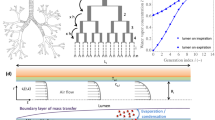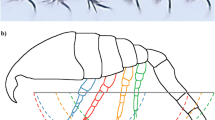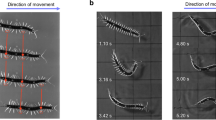Abstract
WHEREAS in mammals the factors controlling lung ventilation have been intensively studied, data for respiratory control in the invertebrates are relatively scarce. The cases hitherto investigated of the environmental factors (other than temperature) which influence respiratory movements in the invertebrates have shown that sometimes both carbon dioxide excess and oxygen deficiency act as stimulants (snails1, Octopus2, insects3,4), sometimes carbon dioxide alone is effective (Squilla5), while in other cases it is oxygen alone which is responsible (Tubifex6).
This is a preview of subscription content, access via your institution
Access options
Subscribe to this journal
Receive 51 print issues and online access
$199.00 per year
only $3.90 per issue
Buy this article
- Purchase on Springer Link
- Instant access to full article PDF
Prices may be subject to local taxes which are calculated during checkout
Similar content being viewed by others
References
Dahr, Lunds Univ. Arssk., 20; 1924.
Winterstein, Z. vergl. Physiol., 2; 1925.
Stahn, Zool. Jahrb., 46; 1928.
Hazelhoff, Z. vergl. Physiol., 5; 1927.
Matula, Pflügers Arch., 144; 1912.
Alsterberg, Lunds Univ. Arssk., 20; 1924.
Fox and Simmonds, J. Exp. Biol., 10; 1933.
Author information
Authors and Affiliations
Rights and permissions
About this article
Cite this article
Fox, H., JOHNSON, M. Control of Respiratory Movements in Crustacea. Nature 131, 514–515 (1933). https://doi.org/10.1038/131514a0
Issue Date:
DOI: https://doi.org/10.1038/131514a0
Comments
By submitting a comment you agree to abide by our Terms and Community Guidelines. If you find something abusive or that does not comply with our terms or guidelines please flag it as inappropriate.



